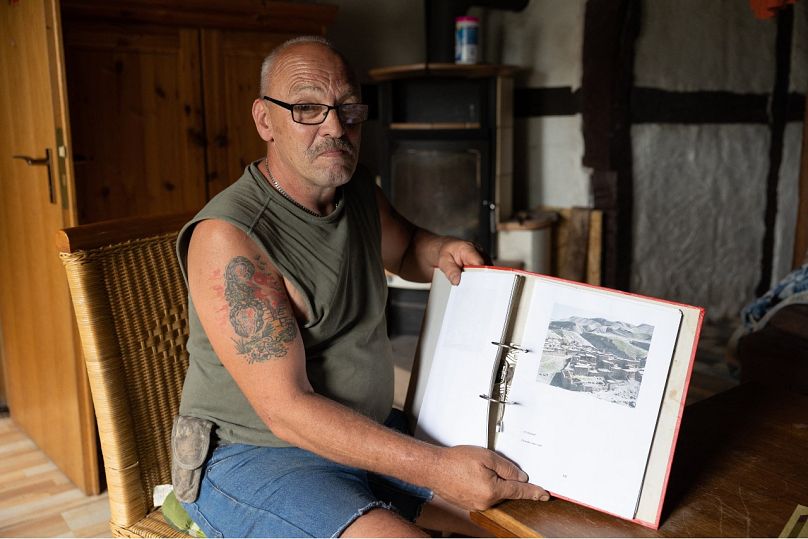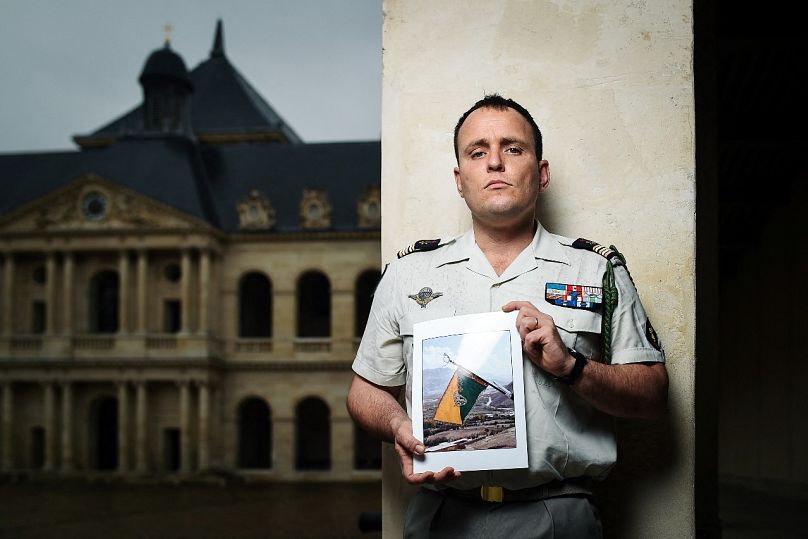Some former soldiers in the West have questioned the purpose of the enormous military sacrifices in the 20-year campaign, as troop withdrawals enabled the Taliban to take control.
Many have watched with horror the debacle of the chaotic Western withdrawal of troops and diplomats from Afghanistan, leaving the local population to the mercy of the Taliban takeover. But for former soldiers who served in the country, the events are all the more poignant.
 ADVERTISEMENT
ADVERTISEMENT
 ADVERTISEMENT
ADVERTISEMENT
Some of the angriest, most bitter reactions have come from British veterans. The UK sent the second highest number of troops to Afghanistan, after the United States.
Jack Cummings lost his legs while fighting in the country, and tweeted on his "bangaversary" -- the squaddie term for the anniversary of being blown up -- "Did I lose my legs for nothing, looks like it. Did my mates die in vain. Yep."
The former bomb disposal specialist served two tours with the 101 Engineer Regiment in Afghanistan and competed in the Invictus Games.
He has told of how the British army gave the Afghans "the best training", and describes as "heartbreaking" the experience of seeing the country "go up in smoke" in around a week.
'I would do it all again tomorrow'
Former Army Major Rob Shenton served two tours in Afghanistan in 2008 and 2011/12, including as a liaison between locals and the military when deployed in Helmand province.
"I helped create a municipal work scheme to employ locals. The first local I met ran that scheme. We became good friends. Five months later I put his body in a coffin and sent him back to his family for burial before sundown. He had been shot on his front door by the Taliban," he told Euronews.
"I can't really describe how that felt when I had to do that. These were people we use to drink tea with in the evenings and chat. I am numb to a lot of my emotions around these relationships now," he added.
He described his tours, particularly his first one, as "heart-stopping, heart-breaking and heart-rendering" yet also "professionally fulfilling".
And there were consequences. Shenton developed Post-Traumatic Stress Disorder (PTSD) and tried to take his own life a year after returning from Afghanistan.
"I ended up in a mental hospital. I knew my life would never be the same again. A few years after that I was medically discharged from the army after 25 years in uniform. I am getting better now without (veteran support charity) Help for Heroes I would be in a far worse place.
"But despite, what happened to me I am proud of what we did. It exemplified the excellent teamwork that the British Army is great for. I would do it all again tomorrow if I could. We all did our duty to the best of our ability and beyond," he stressed.
Coverage can be 'triggering'
Other British veterans have also expressed severe frustration. The British parliament was recalled on Wednesday to debate Afghanistan, but former defence minister Johnny Mercer -- who served in the country as a soldier -- is scathing about his own Conservative government's handling of events.
"Parliament's being recalled. So what? The airport is under siege," he told the BBC. "Boris Johnson has said he doesn't want Afghanistan to become a place for terrorism, it doesn't mean anything to the families of those who lost their sons and daughters in this war."
Other senior Tories have uttered similar criticism of the government, for failing to do more to stand up to the Americans bent on withdrawal, and help Afghan forces and the population. "What the hell did they all die for?" ran the Daily Mail's headline on Monday, referring to the losses among British service personnel.
"The situation in Afghanistan may be distressing for anyone who has served or been affected by conflict," says Help for Heroes, a support group for men and women who have been physically or psychologically wounded while serving with the British Armed Forces.
Sarah Jones, head of psychological wellbeing for Help for Heroes, told Euronews the charity has heard "from many of the veterans we support that they are finding the coverage concerning".
"The kind of graphic content being shown in the media can be triggering to anyone who has experienced being in a conflict zone. The sights and sounds can cause them to recall difficult events and relive traumatic experiences. As such their need for support may be heightened at this time.
"We expect there to be a significant mental health need in the future as a result of the current events," she went on.
Former Army Major Shenton told Euronews he can relate to veterans feeling anxious over the developments.
"I have been lucky, it has taken me years to be able to look at some of the media coverage and books that were written during my first tour. Only last month I looked at a BBC Newsnight report done all those years ago. I managed to connect with someone on the same tour, and found out that one of the soldiers in that report had taken his own life a few years ago," he said.
The charity has issued advice to veterans who may need help.
'The experience was worth it'
Germany also contributed significant troop numbers to NATO forces in Afghanistan. Armin Laschet, head of Angela Merkel's conservative party and possible successor to the German chancellor, has called the pullout the Western military alliance's "biggest debacle" since its creation.
But among German soldiers who served in the country there are some more philosophical views.
"The experience was worth it, I got to know other countries, other peoples, other customs. We also received a relatively warm welcome from the population, we could feel that," says Andreas Braeutigam.
The 58-year-old was deployed in Afghanistan for eight months from 2003-2004. He was almost killed by a shot which pierced his ear, and lost seven comrades in a German helicopter crash. Also a veteran of NATO campaigns in the former Yugoslavia and Kosovo, today he suffers from Post Traumatic Stress Disorder (PTSD).
"The Afghan people gained freedom, especially women, but it's in the middle of being undermined," he told AFP recently as the Taliban advanced across the country amid the Western troop withdrawal.
Yet he also wonders whether the NATO mission made any difference to Afghanistan: "NATO was not designed to do a lot of things -- we cannot make a state bend," he says.
"No one can do it, not even us, and as long as the Taliban are more numerous and supported by other countries. No matter which army comes in, there will be no chance of bringing peace to the country."
French lieutenant colonel Jean Michelin served in Afghanistan in 2012. Still in active service, he is preparing for a new mission to Africa's Sahel region, and says although the experience marked him deeply, he cannot afford to reflect too much on the past.
"We cannot live with the weight of Afghanistan forever. A soldier's job is also to be ready to go again. I cannot take Afghanistan in my suitcase," he told AFP.
Speaking in July, he argued that it's not a soldier's job to ask whether it was right for international troops to be deployed to Afghanistan.
"The 'why?' is not a military question, it is a political issue," he said. "There is a precedent in Afghanistan of digesting and spitting out foreign forces who come. We are not the first ones to have experienced this."
There are also mixed feelings among American forces, now watching helplessly as the Taliban they once fought take over Afghanistan.
"I do firmly believe that it was time to come home. We put a lot of money and training into the Afghan army, where we gave them the tools they need to stand on their own," Marc Silvestri said recently.
But watching the chaotic pullout unfold in real time has stunned the 43-year-old head of veterans services in Revere, Massachusetts.
"I never expected the speed and the brazenness of the Taliban would be what it is," he said. "I never expected that the training and money we put into the Afghan army, that they would just lay down their weapons and turn the country over. That's been shocking to me."
For veteran Chad Fross, the withdrawal of US troops "was always going to be a mess" regardless of who was in charge, because of a failure to fully understand Afghanistan.
"A lot of people are going to be asking, 'Why? It was pointless for me to be there. To watch friends die or lose body parts or lose their minds,'" he added.
"But at the same time, I have to wonder how much more pointless it would be to stay the course when it would be the same outcome 20 years from now."
More than 3,500 service members were killed in the Afghan campaign since the US-led invasion of the country in 2001. Thousands more were maimed.
Afghans have seen significant progress in some areas: infant mortality fell by 50 percent, according to Harvard UNICEF in 2018, while more girls attended school, although a 2017 Human Rights Watch report said two-thirds were still kept at home.
The US, the EU and others in the West have called on the Taliban to respect fundamental rights, including those of women and girls' education. How such appeals can be enforced in future is unclear. Short of Afghanistan providing a terrorist threat to the West, another military intervention is hard to imagine.












